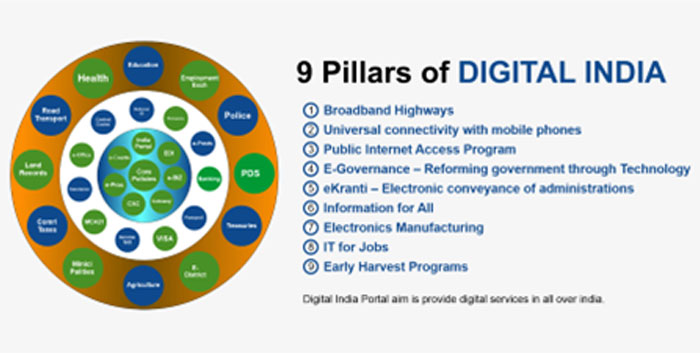The newly sanctioned funds will serve as a catalyst for driving innovation, inclusion, and connectivity across various sectors.
The Union Cabinet of India gave its unanimous approval for the expansion of the Digital India programme and allocated a substantial sum of ₹14,903 crore to propel the ambitious initiative forward. With this historic decision, the Indian government has reaffirmed its commitment to harnessing the potential of digital advancements for the holistic development of the nation.
Launched in 2015 by Hon’ Prime Minister Shri Narendra Modi, the Digital India programme has been a beacon of progress in the country’s journey towards a technologically empowered society. With the rapid evolution of the digital landscape, the need to scale up the programme became evident. The newly sanctioned funds will serve as a catalyst for driving innovation, inclusion, and connectivity across various sectors. At the heart of this expansion lies a vision to bridge the digital divide that exists between urban and rural areas, ensuring that the benefits of technology are accessible to all citizens.
“India’s expansion of the Digital India Programme reflects a visionary stride towards technological empowerment. The infusion of Rs 14,903 crore underscores the nation’s commitment to fostering digital skilling, cybersecurity, and AI innovation.”
Sunil Sharma, Vice President – Sales India and SAARC, Sophos
An EY study reports that a Joint collaborative research by Huawei and Oxford Economics pegged the size of the global digital economy to be around US$11 trillion i.e., 15.5% of global GDP in 2016, which is expected to reach US$23 trillion (24.3% of global GDP) by 2025.
As per RBI, industries with the highest forward linkages in India from the aggregate core digital economy in 2019 were construction (6.1%), renting of machinery and equipment (4.2%), food beverages and tobacco (3.8%), textiles and textile products (3.6%), and electrical and optical equipment (3.5%)2.
The number of digital transactions increased more than three times from 300 crores in November 2019 to 1,052 crores by January 2023.
As articulated by D. K. Srivastava, Chief Policy Advisor, EY India, a recent study by MeiTY (2019) has estimated the size of India’s digital economy at US$200 billion in 2019, which is expected to rise to US$500 billion by 2025 in their ‘business as usual’ scenario. However, they also point out that potentially, the size of India’s digital economy can be increased up to US$1 trillion by following a set of policy initiatives covering 30 digital themes under 9 national goals: (1) 21st-century IT infrastructure and software capabilities, (2) E-governance of the future, (3) Healthcare for all, (4) Quality education for all, (5) Energy for all, (6) Next-generation financial services, (7) Doubling farmers’ income, (8) Make in digital India, make for India, make for the world and (9) Jobs and skills of the future.
As per a study India to grow excess of 10%+ in digital economy which is second to that of China.
Fund Allocation for Key Target Areas
- 6.25 lakh IT professionals will be re-skilled and up-skilled under the FutureSkills Prime Programme.
- 2.65 lakh persons will be trained in information security under the Information Security & Education Awareness Phase (ISEA) Programme.
- 540 additional services will be available under the Unified Mobile Application for New-age Governance (UMANG) app/ platform. At present over 1,700 services are already available on UMANG.
- 9 more supercomputers will be added under National Super Computer Mission. This is in addition to 18 supercomputers already deployed.
- Bhashini, the AI-enabled multi-language translation tool (currently available in 10 languages) will be rolled out in all 22 schedule 8 languages.
- Modernisation of the National Knowledge Network (NKN) which connects 1,787 educational institutions.
- Digital document verification facility under DigiLocker will now be available to MSMEs and other organisations.
- 1,200 startups will be supported in Tier 2/3 cities.
- 3 Centres of Excellence in Artificial Intelligence on health, agriculture and sustainable cities will be set up.
- Cyber-awareness courses for 12 crores college students.
- New initiatives in the area of cyber security including development of tools and integration of more than 200 sites with National Cyber Coordination Centre.
Speaking on the development, Sunil Sharma, Vice President – Sales India and SAARC, Sophos, said, “India’s expansion of the Digital India Programme reflects a visionary stride towards technological empowerment. The infusion of Rs 14,903 crore underscores the nation’s commitment to fostering digital skilling, cybersecurity, and AI innovation.”
“As a leader in next-generation cybersecurity, Sophos recognizes the pivotal role of cybersecurity in this journey. The acute skills gap in cybersecurity is an ongoing concern. This plan to train 265,000 citizens in cybersecurity under the ISEA Programme, is a positive step forward. However, bridging the skill gap requires collective efforts and Sophos is steadfast in providing AI powered security solutions as well as collaborating with academia, industry, and the government to nurture a skilled workforce. Together, we can fortify India’s digital landscape and ensure a secure and prosperous future,” he added.
This announcement surely will give a boost to the digital economy of India, which has so far been great mover. It will also create convenience and efficiency for the citizens to access various services offered by the government and private sectors. At the same time, it would also enhance the growth of IT and electronics ecosystem in the country and definitely help India to become a great ICT manufacturing, software and application development destination.


